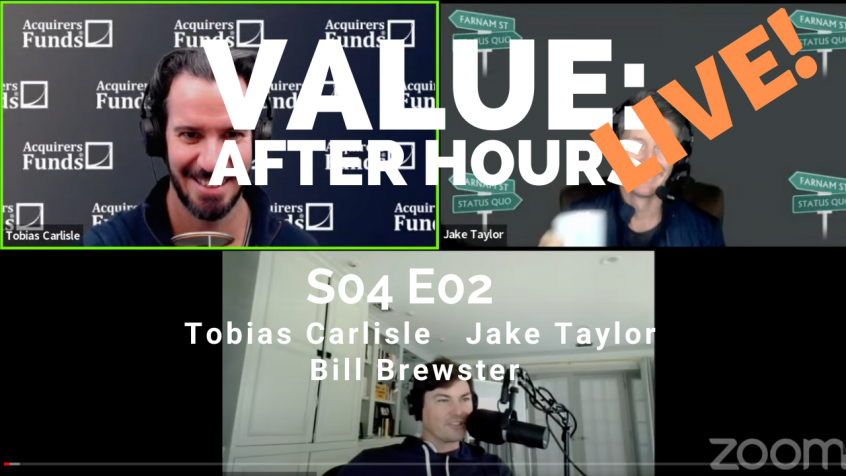In their recent episode of the VALUE: After Hours Podcast, Taylor, Brewster, and Carlisle discuss Terry Smith – First Order Of Commodity Price Spike Not On Consumer Prices, But On Company Profits. Here’s an excerpt from the episode:
Tobias: There’re a lot of facts and figures in his little article. So, I was just interested in this little thing from Terry Smith at Fundsmith. It is great name for a fund, by the way, or for a firm. He said that the first order of commodity prices kicking off isn’t felt by consumers. Because they tend to be a first order goods consumed by producers or consumed by manufacturers, consumed by businesses. So, they impact business profitability before they impact consumers. But the way that they might show up is like some increase in the discount rate. So, high-quality companies definitionally has very high margins and can control its margins.
If its input costs go up depending on what portion of those margins the input costs consume, that’s how much impact the profitability, may be that that increase in the cost, cuts the margins, warrants an increase in the discount rate. So, you see some of these companies that are intensive consumers of commodities being impacted. I don’t know if you then necessarily want to go and get longer haul of these commodity plays. They haven’t been particularly good, gold does look interesting, energy has been running. I don’t know. What do you guys think?
Bill: I think that you said that high-quality companies have high margins and there was one amendment. They can have high turnover and low margins. That’s another way that you could run that. Like, Costco, for instance. But I agree that they have pricing power. I talked to Will Thompson. Will runs massive capital and I interviewed him. It’s coming out, I think, in two weeks. He said something that I think is really right. I think it’s been somewhat similar when I pitch banks in the past like big banks. Although, Will’s, I actually do think was an asset specific thesis. When you get generalists that are pitching big commodity companies, it’s basically a macro bet.
Tobias: Yeah.
Bill: And that rarely goes well. I think it’s interesting that a lot of people right now that I see just in the chatter and whatever are like, commodities are cheap and everything else is expensive. But then it seems to me that at least some of these people are projecting that we’re in an everything bubble. My question is, if the everything bubble pops, it would tend to suggest to me that commodity quantity demanded would go down. If the quantity demanded of a commodity goes down the operating leverage bucks you hard, and that is like a technical term. I think that maybe– [crosstalk]
Jake: CFA Level III.
Bill: Yeah. Then they’re not so cheap. On the other hand, see what’s going on with lumber and it’s like, man, if this sticks, oh, my. So, I don’t know.
Tobias: Mike Mitchell’s been in the comments. There you go, Mike. We finally got into lumber.
Bill: Yeah. I don’t know. I understand why people like commodities right now. I don’t know, man. Cheap cyclicals, generalist pitching commodities, generalist pitching big banks, I’m not sure how the base rates work on that.
Tobias: JT?
Jake: Hard to unpack. There’s a lot of moving pieces to all this. I think it’s pretty safe to say I think that and like, Einhorn has observed this that, the capital that’s gone into those industries has really been shut off and pinched off.
Tobias: Yeah.
Jake: We’ve probably spent a lot more capital, a lot more interest going into software projects, then there has drilling for oil, or iron ore, or something. So, I don’t know. I think these things all move in cycles and eventually there’s some reversion to the mean on all of them. I don’t know how long that takes. I don’t really care what generalists are saying or doing, or I wouldn’t try to use that as a measuring stick for much. That’s basically Mr. Market adjacent. But I don’t know. Very long term, I think that long commodities is short human ingenuity and I wouldn’t really want to be short human ingenuity for a long time.
Bill: I guess, what I would say about the generalist comment that I made is, if you listen to Mike talk about lumber, I think that’s how good you have to be in commodities. It’s not a game to just in my opinion look at and be like, “Yeah.” Now, that said–
Jake: Which investment space is right where you should just have a half assed understanding? Just punting.
You can find out more about the VALUE: After Hours Podcast here – VALUE: After Hours Podcast. You can also listen to the podcast on your favorite podcast platforms here:
For all the latest news and podcasts, join our free newsletter here.
Don’t forget to check out our FREE Large Cap 1000 – Stock Screener, here at The Acquirer’s Multiple:




